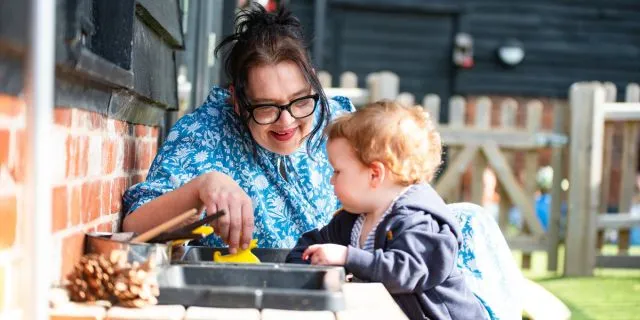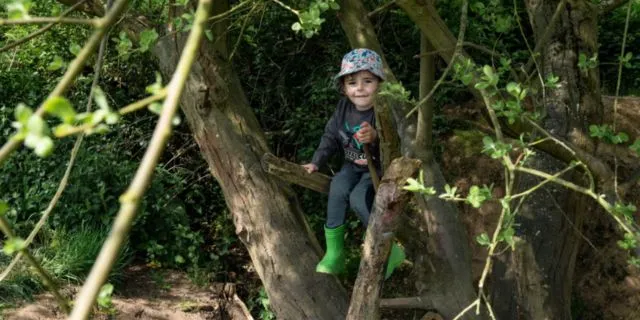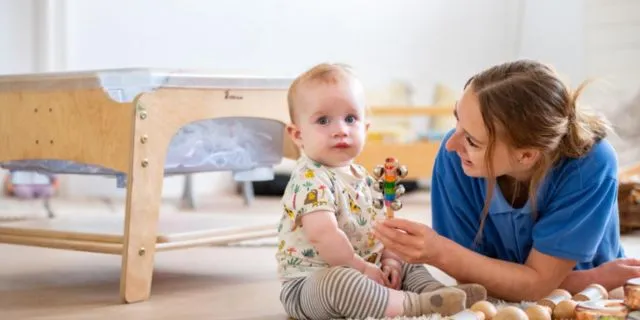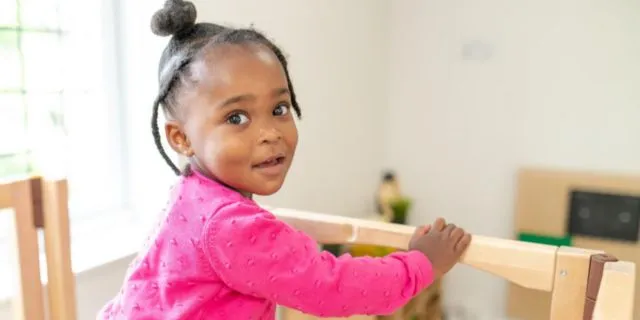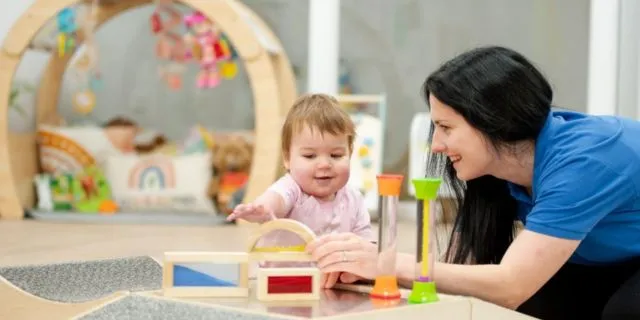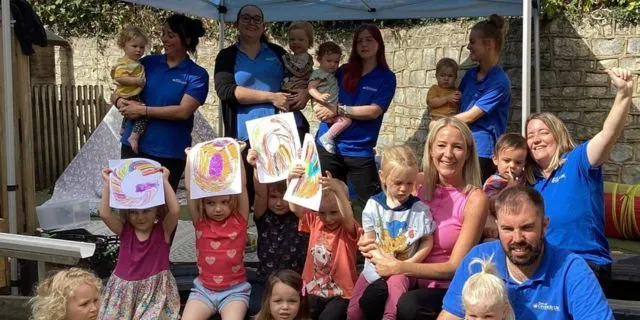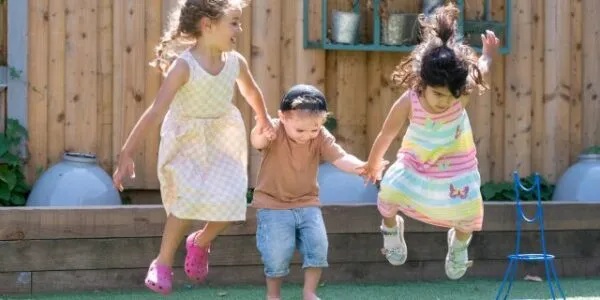
Choosing the right childcare for your child is a huge decision which every parent wants to feel secure in. While it’s completely natural to want to explore your options, nursery education provides far more than just a place for your child to stay – it offers increased social, emotional and cognitive development and builds confidence. In fact, many parents who were initially uncertain about nursery later find that their child thrives in the structured, stimulating and supportive environment it offers.
Research consistently highlights the plethora of benefits of high-quality nursery education – for children and parents alike. A 2023 Department for Education survey found that 72% of children aged 0 to 4 in England were in some form of childcare during term time, with 63% attending nurseries or other formal settings. That means the majority of parents are choosing nursery because it provides not just care, but a strong foundation for their child’s future. This blog dives into the overlooked benefits of nursery education whilst also highlighting how Grandir UK nurseries integrate all these valuable benefits into children’s daily lives through engaging and enriching activities.
The lasting benefits of nursery education for children
Social development
Children who attend nursery spend a significant amount of time interacting with other children. This might be through engaging group activities, playing together outside or participating in collaborative learning experiences such as storytelling. This continuous channel of communication is fundamental in progressing a child’s language development and shaping their social skills.
Children at our Kiddi Caru Great Park Road in Bradley Stoke nursery regularly engage in activities which are centred around developing their communication skills. In Summer 2024 the children participated in a group ice play activity where they explored different textures, temperatures, and descriptive language. Activities like this ultimately help enhance a child’s motor skills, use of touch, vocabulary and promotes social interaction which they can use in other settings for example in primary school and onwards.
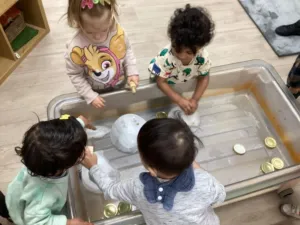
Emotional development

Learning to understand and express emotions from an early age is a crucial skill that greatly benefits children as they grow. Nursery provides the perfect supportive environment for children to develop these emotional skills. By introducing emotional regulation techniques, children are taught how to express their feelings in a healthy and constructive way. Additionally, empathy and patience are areas which are developed through a nurturing nursery setting, this might be done through activities like cooperative play or teacher-led discussions on emotions. At our Islington Square Day Nursery and Preschool, children recently created an ‘emotions display board’—a fun, interactive way to help them name and understand their feelings. Activities like this teach children how to express emotions, practice empathy, recognise emotions, and build confidence in social settings—all skills that will support them in school and beyond.
Cognitive development
Structured play and social interactions play a crucial role in shaping a child’s cognitive abilities, equipping them with skills which extend beyond the nursery setting. Hands-on activities such as structure building and participating in games such as puzzles helps children develop their critical thinking skills, enhance their memory and learn to recognise patterns and relationships.
Similarly, participating in imaginative play and role-playing scenarios not only nurtures creativity but also improves logical reasoning. For example, when children pretend to run a shop or act out real-world situations, they learn to tackle challenges, make decisions, and collaborate with others. These experiences build their confidence, independence, and problem-solving skills—qualities that will help them adapt to new environments, from starting primary school to forming friendships and handling everyday challenges. By fostering these skills early, nursery lays the groundwork for a child’s ability to think critically, solve problems, and approach the world with curiosity and resilience.
Enhanced motor skills
Early Years education doesn’t just have a positive effect on children’s cognitive development, it positively impacts their physical development too! Through activities like drawing, outdoor play, structure building and painting, children’s fine and gross motor skills are improved. Nursery practitioners are constantly finding new activities which benefit children’s physical development. For example, children at Little Explorers Day Nursery and Preschool in Knighton engaged in a pegboard activity which required them to pick up and place small pegs into holes, helping them strengthen finger muscles, enhance their concertation and improve hand-eye coordination. All these aspects are important for writing and self-care tasks later down the line. By offering these kinds of thoughtfully planned activities, nurseries ensure that children are developing the physical skills they need to confidently take on new challenges, both inside and outside the classroom.

Building confidence and independence
Every parent wants their child to grow up to be confident and independent – and nursery education provides the perfect foundation for this growth. In a nurturing, engaging and warm environment, children are encouraged to let their creativity run wild, make choices and solve problems independently, helping them to build a strong sense of self-belief and autonomy.
Whether it’s joining in on an activity such as storytelling, helping tidy up after playtime, or working collaboratively with friends, the everyday moments within a nursery setting help children gain a sense of achievement and responsibility. They also learn how to share, take turns, and listen to others — essential skills that help them make friends and feel part of a group.
By the time they start primary school, they are well-prepared to navigate new routines, form positive relationships, and enjoy learning — setting them up for success now and in the future.
Preparing children for primary school and long-term educational success
Transitioning from home straight into formal schooling can understandably be a challenging process for children. Nursery education acts as the perfect bridge between these two stages, gently introducing them to the classroom setting and helping them adjust to structured learning in a nurturing and supportive environment. Throughout their time at nursery, children are introduced to structured routines, discipline, and basic classroom etiquette – which are all skills which will help them transition into the formalities of primary school.
The key benefits of nursery education for families
Access to childcare funding
One of the most prominent considerations for families in the UK is understandably the cost of childcare. Eligible parents of 9-month to 3-year-old children can typically access 15 hours of free childcare per week over 38 weeks a year (term time). Alternatively, children aged 3-4 years old qualify for funding of between 15 and 30 hours per week under the Government’s Free Early Education Entitlement (FEEE) programme.
You can check your eligibility for Government Supported funding here.
Supports working families
Enrolling your child into nursery opens doors for working families. Having a reliable nursery your child can attend enables parents to return to work or advance their careers without childcare constraints. You can send your child to nursery on either a part time or full-time basis – whatever is needed to suit your lifestyle.
Enhances family dynamics
Parenting can be one of the most magical and rewarding journeys a person can go on, but it isn’t always plain sailing and comes with its challenges. Nursery gives parents the opportunity to balance their work life, personal time, and family time more effectively. Many parents find that having dedicated time for work, other children’s needs or self-care helps them be more present and engaged when they spend time with their child. A well-rested, less stressed and happy parent means a happy child!
Encourages social connections for families
Nurseries create a great opportunity for families to connect with one another through events, groups, and parent-teacher interactions. This helps build a sense of community and great friendships. Most Grandir UK nurseries offer a range of social and celebratory events for families to enjoy – these include cheese and wine evenings, Mother’s and Father’s Day celebrations, graduations, Christmas parties and more!
Things to consider
Quality nursery education offers more than just a safe space for children while parents are at work – it also plays a crucial role in shaping a child’s early development and preparing them for future success. From enhancing social, emotional, and cognitive skills to helping build the independence and confidence they need for school readiness, nurseries provide a structured yet nurturing environment where children thrive. Additionally, families also benefit from improved work-life balance, social connections and access to government supported childcare funding.
The process of choosing a nursery is more than just finding childcare, it’s about providing your child with the right environment for them to grow, learn and flourish. From building friendships with other children to preparing for school, nursery education lays the groundwork for a bright future.
As a family of nurseries committed to providing excellent Early Years education, we ensure every child’s nursery experience is enriching, engaging and supportive.
Visit your nearest nursery today and see how we can help your child thrive!
Share this article
Related blog/news
Swipe to see our latest articles.

